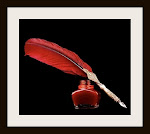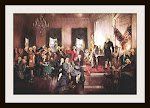
While we government officials may not ever come close to being “party animals,” we have made it a permanent fixture in our busy schedules to attend at least the levees hosted by the President and his wife. For all you attentive persons out there, you may stare in shock and say, “Well, isn’t that what British monarchs had? All those in favor of a democratic republic ought to repudiate such events!” Now there, my radical friend. The only attendees allowed were men, but so long as you are dressed well for the occasion, you should not experience any troubles.
As I was pondering over what to write on this week’s blog post, I thought it important that the events not characterized by names such as the “national bank proposal” or “legislation” ought to be documented for posterity. One such event is President Washington’s levees, what I like to call “a gathering of the well-dressed attention seekers.” While it may sound insolent, it’s very true. Those wishing to be in favor with the President ransack their wardrobes for the glossiest and vogue articles that they can find. It gets ugly.
Not only is it a gathering of fools, but a socially required reception for us government officials. It would be impertinent to be absent from such; I really don’t know why, but it just is. So, yesterday, I (ironically) looted my closet of meager belongings (everything nice is at the dry cleaners) and managed to uncover a suit of a bold dash of green, a waistcoat (“You are so boring when it comes to waistcoats,” my wife often tells me), and silk stockings which bear the result of one too many times stepped in a puddle. Desperate times call for desperate measures. At least I had a decent pair of shoes, but the buckles looked like they had been the playthings of some wild beast with fangs. But look on the slightly positive side: I finally found my favorite pair of socks! (I can just hear the crickets in the background.) The dark abyss that is my closet rarely ever yields anything, much less something fit for a presidential levee. After that brief struggle, I tended to my hair, as I distrusted hairdressers. I abstain from powdering my hair; why ought I to look like a sixty-year old clown for the sake of fashion? As I stood back admiring myself in a speckled mirror, I heard a voice full of thought say,
“If I ever saw a government official wear such a vile green, and I was the citizen being represented by the latter, I would wonder to myself ‘I thought they were men full of wisdom and sense,” and would entirely abandon the notion.”
“Thank you, Thomas… for those kind words of sympathy.”
This is what happens when you agree to go along with your cousin.
“Why,” he said as he strolled into the room, “it was a merely a piece of fashionable advice.”
“At least I don’t go around town sporting some sort of aristocratic, blown-up poof on my head that is strikingly similar to a that a deranged man’s taste in hairstyles,” I muttered under my breath about the hairstyles he had recently been experimenting with.
“What was that, dear cousin?”
“Oh, nothing. Just lamenting my bland waistcoat.”
We departed from my apartment in one of the city’s more upscale neighborhoods and headed down the street, stepping over the occasional drunkard and deftly avoiding puddles. In the sky, the moon was but a mere sliver behind the curtain of clouds, leaving us to be guided by gas lamps on every corner. As we hurried along, a gentleman on stilts went around lighting them. I sure hoped he didn’t drop the match. I, for my part, walked in silence, deep in thought, only vaguely aware of my cousin’s babbling as he rambled on about the dangerous antics of the Secretary of the Treasury and how the President was entirely oblivious to it. I really could have cared less at the moment, for I was confident in the General’s abilities. After what seemed like an hour of nothing but a whiney Thomas Jefferson, we reached a brightly lit house on the corner of Cherry Street. The levee was held especially late for some reason today. In the background was a still East River. Persons from all ranks of society were politely shoving past one another to get through the door as quickly as possible. After several minutes of fussing, we managed to enter into a magnificent lobby. Ladies in dresses of varying designs with strands of pearls in their hair delicately waved intricate fans as they gossiped with gentleman in subtle colors that took great pride in the perfect hairstyles that they believed rivaled everyone else’s. Above us hung an exquisite chandelier, containing at least a dozen or so candles. Beneath our feet lay a polished wood floor. Benches of elegant woodwork with plush cushions flanked the sides. Portraits of landscapes and majestic scenery adorned the walls. It never failed to show the General’s expert taste in furniture and design. We proceeded to follow the general wave of people into the living room, one as stylish as the lobby. A huge, circular rug took up a great deal of space in the center before the roaring fireplace. A small mahogany table with two chairs stood in the corner, a well-kept chessboard on top. We gathered in what was attempting to be a circle, but rather an oval, and waited for the President. Chatting quietly amongst ourselves, I leaned to the side, and asked Thomas,
“It appears that this particular reception is most irregular. Did you hear about anything new?”
“Nope.”
Suddenly, Washington’s personal secretary, Tobias Lear, opened the door from the other side and the President entered, trailed by Colonel Hamilton and joined by Lear. The Treasury Secretary chose for the occasion the usual striking colors, today a deep red, comparing him to a ripe tomato. Mr. Lear was more modest, wearing blue like that found on our national flag. The General went outside his usual attire. He sported a suit of deep green; an off-white waistcoat, his shoe buckles being gold this time; stockings matching his waistcoat; and a dress sword hung at his waist. The room turned silent, and he proceeded to walk around the circle, Mr. Lear introducing him to newcomers, and he would converse with them in a few words. We waited patiently until he reached us. Although I really had no real reason, I was intimidated by his presence, and it appeared the same was of Thomas.
“M-m-Mr. P-president, as you very well remember Mr. Randolph and Mr. Jefferson.” Mr. Lear was a timid man, small in stature, and non-existent in conversation.
“Indeed, Mr. Lear.” The General peered at us closely like specimens.
“Mr. President,” we said is unison, and bowed.
“Gentlemen. Now Mr. Randolph, something has been troubling me for several weeks. It appears that a court in Massachusetts’ first district has been openly protesting the Constitution by conducting court decisions as if under the previous Articles of Confederation; would you mind looking into that?
“Of course, Mr. President.” As you can see, I have the most uninteresting department in all the government.
“And you, Mr. Jefferson. Does Monticello prosper?”
“Why, yes, Mr. President. I have just begun to use your crop rotation method. Most ingenious!”
With that, they launched into a discussion on the aforementioned method, and I was left standing there like a fool. Agriculture had no especial appeal to me. I looked beyond the President’s shoulder, and saw Colonel Hamilton looking in my direction. He appeared to be sneering at me due to my lack in partaking in the conversation, but I couldn’t say for sure. The President finally completed his rounds, and we lapsed into discussion. I made my way across the room to Mr. Fisher Ames, a congressman from Massachusetts. I never really had a particular liking for him, but he had the credentials of a patriot. He represented the first district of Massachusetts, and I hoped that my discussion with him would go smoothly. When I reached him, he was discussing foreign policy with a fellow representative.
“Excuse me, Mr. Ames.”
He turned around, and gave me a skeptical look. We never really got along that well.
“Oh, good evening, Mr. Randolph. May I help you?”
“Good evening, sir. May I have a word with you?”
“Surely.”
He kept staring at me dubiously as we departed from his colleagues and walked to an empty corner of the room.
“Mr. Ames, I am ashamed to hear of disorderly and unpatriotic behavior in your district. Do you have any particular reason that could possibly account for such?”
“Please accept my sincerest apologies on behalf of my constituents. Such behavior was instigated by rebels and advocates of sedition. It does not in any way represent the true feelings of Massachusetts, its delegation, or the rest of its loyal citizens.”
“If such continues, we will be forced to break off entirely from them, and continue on.”
“Such will not be necessary, Mr. Randolph.”
“But something is. I have been commissioned by President Washington to look into the issue. I suppose that includes quelling it.”
“You would not dare unleash the power of the military force upon the people!”
“It is not my intention to do so. The process would be one of peaceful negotiations and diplomacy that will furthermore discuss the fears of this… opposition and bring to light for them the reality of the Constitution. But if such measures fail, we will proceed by force.”
Mr. Ames seemed to pale.
“Has such behavior ever exhibited itself before?”
“No sir. At present, I have no knowledge of their ideas or their origins. Surely, as this is such a small group of persons, maybe it does not need the involvement of the federal government?”
“Why do you think the President asked me to look into it? It means that the issue is larger than you think it is. He must believe that it poses some sort of danger to the American republic; like a contagious disease, it could spread, and cause sedition and the like. In addition, it probably implies that previous attempts on a lower scale to put an end to it failed.”
“Sir, before we come to any conclusions, I first must review the situation, see the ideas and the like, and report back to you.”
“Very well then. I expect a report by fortnight.”
“Yes, sir,” and with that, he scampered off.
It personally bothered me that such was occurring.
Was this an omen to the American republic?
Are we slowly collapsing, descending into anarchy and all the other gloomy elements of a disunited nation?
The very principles that endanger the Constitution?






















